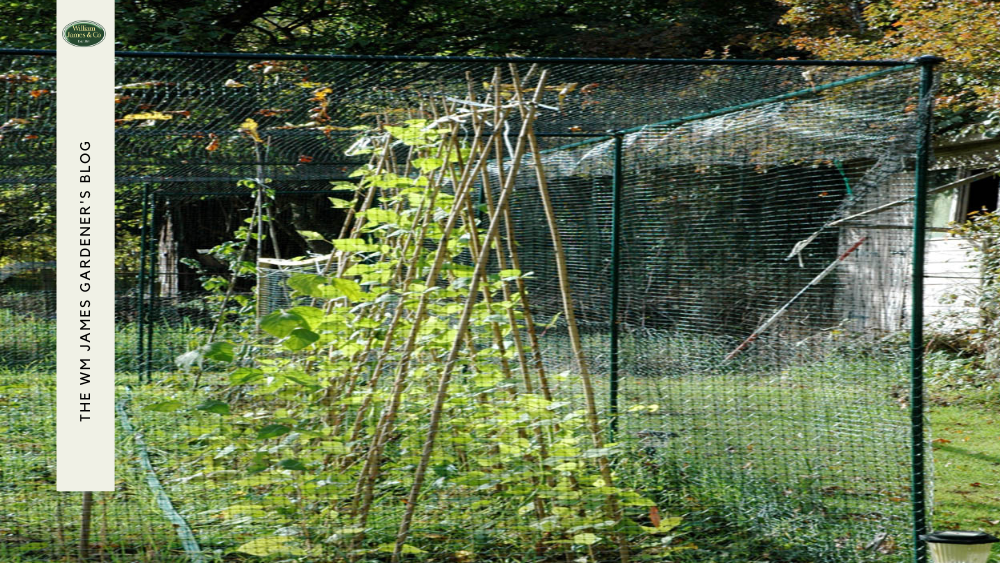We use cookies to make your experience better. To comply with the new e-Privacy directive, we need to ask for your consent to set the cookies. Learn more.
Outfox The Fox: How To Fox Proof A Chicken Coop
- Admin
- WM James Gardening Blog
- 23 Apr 2023
-
407views

We’ve got all the tips & tricks you need to fox-proof a chicken coop to keep your feathered friends safe. Read on for WM James’ advice!
Keeping chickens at home is becoming increasingly popular in the search for sustainable food. But what steps do you need to take to ensure your feathered friends stay safe from foxes?
Statista recorded there were over 1.4 million domestic fowl in 2021/22 in comparison to the 1.2 in 2020/21. This is a big jump in numbers, but with the increase in keeping poultry comes the increase in fox activity.
Foxes can become a real threat to those of us who’re keeping our own chickens, so it’s essential to fox-proof our chicken coops to make sure our chickens are kept safe.
Fortunately, there are some relatively easy steps that you can take to help reduce the risk of foxes entering and attacking your chicken coop, including switching to sturdy and long-lasting coops and netting.
Shop some of our recommendations below and get free UK delivery*!
Understanding The Threat: Why and How Foxes Target Chicken Coops
Foxes are natural predators to small animals like chickens and their eggs. They are clever animals that know how to take advantage of vulnerable spots in chicken coops and will use these to access the birds' food and nesting areas, and the birds themselves.
Chicken coops not only provide foxes with easy-to-locate food, but they offer exciting entertainment. Once they’re aware of a chicken coop, foxes won’t hesitate to take advantage.
If you've owned home chickens for a while, you may be desperately seeking an answer as to how to keep your chickens safe. Learning how to fox-proof your coop effectively and deter foxes is the best way to protect your winged friends.
First Step: Assessing Potential Fox Entry Points
When starting out on a fox-proof enclosure, it's crucial to assess the main entry points for a possible intruding fox to rectify these first.
Once you've discovered the potential holes, it's time to employ a heavy-duty chicken wire. Aiming to cover these bases initially is a great first step to help you feel your coop is more secure.
Shop Our Strong Chicken Coop Netting Here!
It's important to note that, even if you think holes in your coop are too small to fit a fox, these too should be reinforced as foxes can enlarge them to suit their own needs.
We recommend our Weldmesh roll as a long-wearing and secure gauge steel covering for your coop's easy-to-enter areas.
Another top tip is heightening the sides of your coop with wire whilst adding a 45-degree angle facing outwards. Foxes are actually very skilled climbers and able hole-diggers, so creating a fence with an outward-facing overhang reduces the likelihood of a fox climbing over the top and reaching your valued chickens.
Bending the tops of your wire fences and adding plastic fence spikes will increase the effectiveness of this.
Below is a selection of our recommended long-lasting netting to accompany your chicken coop:
Step Two: Camouflaging Your Chicken Coop
We typically picture foxes as predators with greater hearing and sense of smell, and so we can't imagine how to confuse a fox to deter it.
However, you can camouflage and disguise your chicken coop to deter and lead foxes away from your chicken coop.
Scented fox repellents and over-stimulating influences, such as bright lights, are excellent for preventing foxes by creating distance between the fox and the coop before they even reach its perimeter.
Your food scraps are great for feeding your chickens more nutrition whilst reducing your food waste percentage. But, you should avoid feeding scraps in the evenings and after dark. This is because, as nocturnal animals, foxes will wait till this time to hunt.
They also will catch the scent of food scraps and be led straight to the coop you're attempting to protect.
One last idea for deterring foxes and camouflaging your coop is to get a dog! If you're a dog owner, your chickens may be in luck. It's been proven that foxes avoid gardens in which they can smell the family dog; again, hiding your chickens in plain sight as foxes avoid straying too near.
Here are our recommended chicken coops for your prize egg layers. (Don’t forget to add fixings and accessories to your basket before you check out!)
Step Three: Double-Checking Your Work
Fox proofing with chicken wire, sadly, isn't a one-time deal. It's important to routinely check your chicken coop for signs of entry and/or attempts to enter.
Locating where a fox thinks is an easy entry target is a great way to know how to reinforce your coop for better security.
Oftentimes, a fox will leave signs that you can identify as evidence of attempted entry. These may include footprints near the wire fence and even forced entry and widening gaps.
If you notice any weaknesses or disturbed areas, then it's time to reinforce your coop with a few additional materials. These may include longer and thicker chicken wire and reinforcing the fencing with posts and stakes.
Always remember to double-check your chicken coop for signs of fox activity, as this can help keep your chickens safe from foxes.
Provide us with your measurements today, and we'll custom-make chicken netting to fit your coop perfectly!
Shop Our Custom-Made Chicken Netting Today!
How Do You Protect Free-Ranging Hens & Chickens?
If you're desperate to let your chickens stretch their legs, but terrified of the potential threat, then you need to develop a good system to give you peace of mind.
Extending your coop is definitely a good option here, as it allows your chickens more space to roam, while still keeping them protected.
Similarly to assessing your coop's weak points, you'll want to assess the weak points of your garden. Are there holes/soft ground around your fences and hedgerows that foxes can dig under?
You also want to consider the land that lies outside your garden. If you back on to more gardens, a street, or any other residential area, you can relax a little about placing your chicken run nearer the fence.
However, if you're nearer woodland areas, you should be mindful of the more densely populated wildlife in those areas and place your coop and run strategically in your garden to allow for these factors.
10 Tips on How to Keep Foxes Out of Your Garden
Discover Chicken Coops from WM James
Our wildly popular and structurally sound chicken coops are ideal for a home chicken keeper.
Our aluminium and steel coops are durable and offer your chickens plenty of room to roam for happy, healthy birds. They’re also super easy to assemble, so you don’t have to worry about any complex assembly or construction.
Rounding Up: How to Fox-Proof Your Chicken Coop to Keep Your Feathered Friends Safe
Taking all the necessary steps and precautions to fox-proof our chicken coops is so important for keeping our feathered friends safe. Foxes are cunning and sly, so it’s essential to protect your chickens from these predators.
By making sure your coop is secure by assessing any potential weaknesses or access points, you cover any potential risks. Use secure locks, durable materials, and adequate ventilation for the chickens to help keep them safe.
With WM James' chicken coops, you can be confident that your coop will stand up against any fox invasions with its strong and sturdy design.
Shop our recommended products below, and let’s work together to keep your chickens safe from foxes!
*Get free UK delivery when you spend over £100.
FAQs
Can A Fox Chew Through Chicken Wire?
A fox can in fact make its way through thin and easy-wearing wire. Reinforcing your chicken coops with heavy-duty wire mesh is the best way to avoid predators entering and harming your chickens.
How Small A Gap Can A Fox Fit Through?
An adult fox can find its way through a hole as small as 4" (roughly 10cm). That's why it's so important to reinforce any small holes that may appear in your chicken coop. You may think it unlikely, but a fox can easily sneak their way in and cause havoc!
What Scares A Fox Away?
Loud noises, water spray bottles and blowing whistles can help to deter foxes. It's also worth mentioning that your family dog is not only a beloved pet, but can be a trusty assistant in preventing foxes and discouraging them.
Certain scents are also good for masking and preventing foxes from detecting your chicken coop.
What Food Do Foxes Dislike?
You can actually deter many garden pests, such as rats and foxes, by sprinkling spicy chilli powder or garlic powder around your garden. Compounds in these foods are unappealing to foxes and will put them off your garden, and away from your chickens.

















